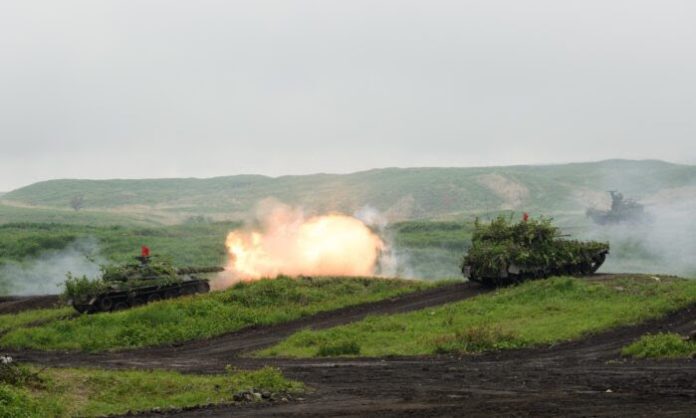Commentary
When the first Japan Self-Defense Force (JSDF) contingent was dispatched to Iraq in 2004, a U.S. Marine officer gave its commander some parting advice: “You’d better be ready to shoot somebody.”
This wasn’t said in jest.
Despite the JSDF being a military in all but name, “shooting people” really wasn’t part of the deal back then. The Japanese government made sure of it and, in the case of Iraq, only agreed to the deployment provided that Japanese troops only built roads and schools—and had Australian troops nearby to protect them.
Even in 2009, when a Japan Ground Self-Defense (GSDF) unit went to train at the U.S. Marine base at Camp Pendleton, California, a “commissar” from GSDF headquarters in Tokyo physically interfered with a Japanese NHK film crew trying to get some footage. Apparently, the idea of the Japanese army actually training for combat was a state secret.
As late as 2016, revelations that the GSDF unit in Iraq was actually on the receiving end of some enemy fire were used as a political weapon by Japanese leftists against the administration of then-Prime Minister Shinzo Abe—even if to little effect.
But that was then. Recently, the JSDF has been conducting serious, high-end exercises with the U.S. Navy and Marines on land and the seas around Japan, even in the middle of the South China Sea. And it is publicizing it, too.
This training included Japanese and American forces simulating targeting and launching missiles to sink ships. The Chinese People’s Liberation Army’s Navy (PLAN) ships come immediately to mind as the prime candidate.
The United States and Japan also just did a small amphibious training exercise near Tokyo—for the first time—and went ashore for combat exercises, with the press warmly invited. And nobody complained about any of this.
Since the mid-2010s, Japan has been quietly fortifying the Nansei Shoto (also called the Ryukyu Islands, extending north from Taiwan) with anti-ship missiles and anti-aircraft systems. It is even talking with the Americans about getting into the mix.
In late 2021, Prime Minister Fumio Kishida called for Japan to have the capability to strike enemy bases. Defense Minister Nobuo Kishi said similar things in public several times. And perhaps not surprisingly, given Chinese threats to launch many nuclear missiles into Japan if it intervenes on behalf of Taiwan, former PM Abe recently called for Japan to consider working a deal with the Americans to place nuclear weapons in Japan.
None of this is likely to happen anytime soon, but it is being said in Japan’s ruling circles. Not long ago, these ideas were taboo. And it appears Japan’s general population is coming around as well. This is a huge psychological change.
It’s taken nearly 20 years, and Japan’s military capabilities still need much work, but Japan is now ready to shoot.
Chinese leader Xi Jinping has accomplished what successive U.S. administrations could not in terms of getting Japan to take its own defense seriously. And Russian President Vladimir Putin’s assault on Ukraine has only solidified Japanese thinking.
After World War II, Japan renounced war as a way of settling disputes—that’s written in the Japanese constitution. But nobody else did. And it couldn’t last forever.
While the Japanese military was perhaps better known for helping out after floods and earthquakes, or building roads in Iraq, there were always JSDF members who knew “shooting” is what militaries do. They tried to prepare as much as they could in case they were needed.
That included the Japan Airborne Brigade and the troops that became the core of the new amphibious brigade. And the Japanese navy—particularly its submarine and anti-submarine force—were “getting ready,” and even put the fear of God in Chinese submariners on occasion.
Japan is not looking for a fight, but has two or three neighbors that are. And if the human experience tells us anything, it’s that the more willing you are to shoot, the less likely you’ll have to.
The outside world has caught up with Japan. Or at least Japan has woken up to it. And it seems like they want to be prepared for what comes next, however belatedly.
Views expressed in this article are the opinions of the author and do not necessarily reflect the views of The Epoch Times.


